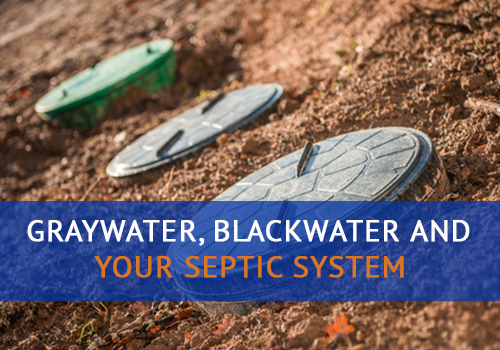Complications with septic systems can mean leaks and contaminated water. There’s a chance that this wastewater carries biohazardous materials. To avoid threats to your health and the environment around you, you should have septic professionals work on your septic system.
But, did you know that not all water in your septic system is dangerous?
There are two terms you should know. Graywater and Blackwater. In this article, we will discuss these two terms and what you should know about both.

What is Blackwater?
Blackwater is about as ominous as it sounds.
Blackwater contains high levels of hazardous bacteria. These dangerous pathogens could come from a few different household sources. Because of this, you should never handle Blackwater yourself. Instead, leave it for the septic professionals.
Take a look at the list to understand the causes of Blackwater better.
Where does Blackwater come from?
- Toilets are the primary source of Blackwater because it’s where the wastewater has had contact with human waste. That’s right. Urine, Feces, and other bodily fluids. It can contain E. Coli and other microorganisms.
- Wastewater from your kitchen drain is also considered blackwater. Why? Because it contains food waste, which will breed bacteria and other pathogens. Think about the everything that you wash down your kitchen sink.
- Laundry water (sometimes). This one depends on the wash load. Washing items that are soiled by human waste, like re-usable diapers, produces Blackwater.
These dangerous pathogens in the wastewater need to decompose before the water can be released into the drain field. Blackwater does not always break down very quickly in your septic tank. Therefore, it is a safe breeding ground for bacteria and other microbes.
Be careful. Remember, handling Blackwater yourself could make you sick.
If you are in a situation where you have or will come into contact with Blackwater, there are a few things you can do to ensure your safety.
- Wash your hands with soap and water immediately after handling the wastewater.
- Avoid touching spots on your body that can get infected. This includes your face, eyes, nose, mouth, and any place that you may have open sores and cuts.
- Try not to touch surfaces, like doorknobs or your phone, directly after handling human waste.
- Try to prevent contamination by wearing boots, rubber gloves, safety goggles, and protective clothes.
- Remove all clothes directly after handling septic water and scrub on down in the shower.
Now that we have sufficiently covered the dangers of Blackwater let’s take a look at Graywater. Graywater, or Greywater, is a product of your septic system too, but unlike Blackwater, isn’t extremely toxic and even has a few benefits.
What is Graywater?
According to the 2018 Florida Public Health Statues in Chapter 381, Graywater is “that part of domestic sewage that is not Blackwater, including waste from the bath, lavatory, laundry, and sink, except kitchen sink waste.”
In other words, Graywater can come from multiple places.
- Your bathtub or shower.
- Your washing machine.
- Bathroom and laundry sinks.
Graywater does contain some organic matter and therefore traces of pathogens. Consuming Greywater is not recommended, but it can be used for other household applications.
Many people, in an effort to Go Green, reuse Grey Water for other necessities. These are some easy ways to jump on board.
- Save the water you didn’t drink in your kitchen cups and random plastic water bottles for other uses.
- When waiting for faucet water to warm up, use a bucket to catch the unused water. You can also use a bucket to catch the water not used when washing vegetables or fruits.
- Water houseplants or potted plants outside instead of using fresh water.
- Wash off the driveway/side of the house with Graywater instead of using the garden hose.
In 2010, Lake County residents used around 125 gallons of water per household a day. Think about how much water you use a day. Showers, laundry loads, brushing your teeth. The majority of your household wastewater is considered Greywater.
Being conscious of your water usage and attempting to recycle your Graywater can have a positive effect on your septic system. It can save you money over time. Recycling Greywater can reduce the need for new water from city sources or your own groundwater. Reusing Graywater can take a load off of your septic tank, extending the life of your system.
Remember, Blackwater can be dangerous to handle. Sometimes the difference between Blackwater and Graywater is not as apparent as you would think. Therefore, we always recommend that you proceed with caution when dealing with wastewater. If you have any questions or need any maintenance on your septic system, do not hesitate to call us at Advanced Septic Services at 352.242.6100.

